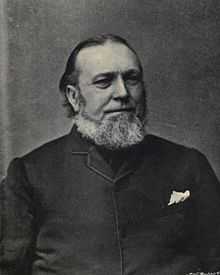Joseph Arch
| Joseph Arch | |
|---|---|
 | |
| Arch, by Elliott & Fry. | |
| Member of the United Kingdom Parliament for North West Norfolk | |
| In office 1885 – 1886 | |
| Preceded by | New constituency |
| Succeeded by | Lord Henry Cavendish-Bentinck |
| In office 1892 – 1900 | |
| Preceded by | Lord Henry Cavendish-Bentinck |
| Succeeded by | George White |
| Personal details | |
| Born | 10 November 1826 Barford, Warwickshire |
| Died | 12 February 1919 (aged 92) |
Joseph Arch (10 November 1826 – 12 February 1919) was an English politician, born in Barford, Warwickshire who played a key role in what Karl Marx called the "Great awakening" of the agricultural workers in 1872.
Biography
Arch had become a well-respected and experienced agricultural worker, and Primitive Methodist preacher and it was to him that the agricultural workers turned. The first spark of resistance came from a brave band of agricultural workers at Weston under Wetherley, who wrote a letter to the local newspaper, setting forth their small earnings and suggesting that farm labourers' pay be raised to at least two shillings and sixpence a day.
An initial meeting was held on 7 February and a meeting was agreed for the following week on of 14 February 1872. Expecting fewer than thirty in the Stag's Head public house in Wellesbourne, Arch found on his arrival that there were over 2,000 agricultural labourers present to hear him speak, on a dark, wet, winter night, the labourers holding flickering lanterns on bean poles to illuminate the proceedings.
On 21 February under the chestnut tree in Wellesbourne it was agreed to elect a committee. The committee met at the old farmhouse of John Lewis in Wellesbourne. Reg Groves states "Here by the light of a solitary lamp, the committee members sat on the old farmhouse chairs or stood on the stone-flagged floor round the table, compiling the list of newly-joined members, counting the union funds heaped in two large tea cups - and discussing ways and means of building the union."
On Good Friday, 29 March 1872, farm workers from all parts of South Warwickshire met in Leamington to form the Warwickshire Agricultural Labourers Union.
On 29 May 1872 in Leamington the National Agricultural Labourers Union was established; Arch became its president and subscriptions were set at twopence a week. A rise then came in the wages of agricultural labourers which had the unforeseen effect of destroying the union as labourers, deeming their object gained, ceased to agitate. Later, lock-outs of union members by farm owners became widespread. The union finally collapsed in 1896 but was resurrected as the National Union of Agricultural and Allied Workers in 1906.

Arch nevertheless retained sufficient popularity to be re-elected to parliament for North-West Norfolk as a Liberal in 1885; and though defeated next year owing to his policy regarding Irish Home Rule, he regained his seat in 1892, and held it in 1895, retiring in 1900. He was said to be well respected in the House of Commons.
Such were the “messiah” qualities of Arch that many self-respecting union-minded agricultural labourers would display a portrait of Arch in their homes.
There used to be a poem recited by the labourers which went:
- Joseph Arch he stole a march,
- Upon a spotted cow.
- He scampered off to Parliament,
- But where is Joseph now?
- presumably because the labourers felt he had abandoned them when he became an MP.
However a more popular song of the time sung by the labourers had a chorus of
- Joe Arch he raised his voice,
- 'twas for the working men,
- Then let us all rejoice and say,
- We'll all be union men"
References
 This article incorporates text from a publication now in the public domain: Chisholm, Hugh, ed. (1911). Encyclopædia Britannica (11th ed.). Cambridge University Press.
This article incorporates text from a publication now in the public domain: Chisholm, Hugh, ed. (1911). Encyclopædia Britannica (11th ed.). Cambridge University Press.- "From Ploughtail to Parliament: an Autobiography of Joseph Arch", The Cresset Library, 1986.
- "Joseph Arch, the Farmworkers Leader", Pamela Horn, The Roundwood Press, 1971.
- "The Farmworkers Champion", Pamela Horn, Journal of Liberal History, Issue 37 (Winter 2002-03)
- "Joseph Arch" by Alun Howkins in Oxford Dictionary of National Biography, OUP 2004-08
External links
| Wikimedia Commons has media related to Joseph Arch. |
- Hansard 1803–2005: contributions in Parliament by Joseph Arch
| Parliament of the United Kingdom | ||
|---|---|---|
| New constituency | Member of Parliament for North West Norfolk 1885 – 1886 |
Succeeded by Lord Henry Cavendish-Bentinck |
| Preceded by Lord Henry Cavendish-Bentinck |
Member of Parliament for North West Norfolk 1892 – 1900 |
Succeeded by George White |
|